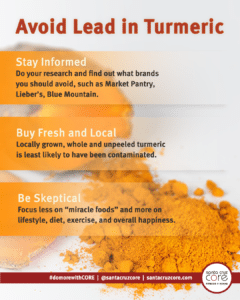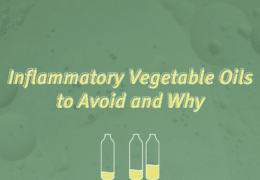You may have already heard the buzz on the internet lately about how turmeric, which health enthusiasts have been raving about, may actually be contaminated with lead.
While most would find this shocking, the presence of lead in turmeric and other spices is actually nothing new. The “adulteration” of spices with toxic chemicals has long been a public health concern in the U.S. and throughout the world. However, old news or not, the presence of lead in anything we ingest is still alarming, and it’s crucial that the public is informed.
No amount of lead is considered safe to ingest, no matter how small. Lead poisoning causes many health problems and is especially dangerous for children. Here is what you need to know about lead in turmeric:
The Adulteration of Turmeric
You might be wondering how lead even gets in turmeric in the first place. One possible source is the soil from which the turmeric grows. While this is possible, it’s almost never the case. It’s actually the industrial preparation process that’s largely responsible for lead poisoning in turmeric. The word “adulteration” is used to describe the process in which a foreign substance is added to food that may be harmful, or lowers its quality.
In the case of ground turmeric, a substance called lead chromate is sometimes added to give the spice that attractive bright-yellow color that consumers often seek. Adding lead chromate also increases the weight of turmeric powder, meaning that manufacturers can sell less of the product at an inflated price.
Adulteration of turmeric is committed by factories all around the world, but is especially common in Bangladesh and in certain parts of India. The most recent spice uproar concerns lead found in turmeric that was imported from Bangladesh, but the adulteration of turmeric and other spices does not start or end there.
Over the past 10 years, many brands of ground turmeric have voluntarily recalled their products due to the lead contamination. Public Health departments from all over the United States have been tracking down sources of lead and pushing for the detainment of shipments from culpable importers.
It’s worth mentioning that average blood lead levels (BLLs) in adults and children show a pattern of national decline, suggesting that public health advocates have been somewhat successful.
The Dangers of Lead
The adverse effects of lead are many, and young children (age 6 and under) are especially vulnerable. Elevated blood lead levels (BLLs) may cause developmental problems in children, including learning and behavior problems. A child might seem sluggish, tired, and irritable. Vomiting and seizures can also occur in severe cases.
In adults, lead increases the overall risk of hypertension and vascular problems such as cardiovascular (CVD) and cerebrovascular diseases (CBVD). Other associated health problems include peripheral neuropathy and renal dysfunction.
Consumption of Turmeric
The consumption of turmeric and other spices has risen in recent years. This may be due to a higher use in natural foods and a desire to limit salt and sugar. This demand is reflected by the processed food industry, which is relying on spices like turmeric for coloring, rather than unhealthy synthetic colorants (2).
It comes as no surprise that the health food industry has also gotten a stronghold of turmeric and its products. It is acknowledged that the active ingredient in turmeric, curcumin, has antioxidant properties that support circulation and cognition.
The new health fad has generated endless supplement powders, pills, cough syrups, probiotic drinks, lotions, and anti-aging creams in an attempt to jump on the turmeric wagon. Unfortunately, the boost of interest in the root may have enticed many companies to adulterate its production.

Recommendations
Stay informed! Those who are proactive about their health and what goes in their food are much more likely to be privy to mass-contamination concerns. Do your research and find out what brands of turmeric have likely undergone adulteration and act accordingly.
So what can you do if you still love turmeric and want to get all the health benefits? Besides checking sources, just buy fresh! As a general rule of thumb, fresh is always better. Try and buy your herbs and spices fresh and locally, as whole and unpeeled turmeric is less likely to have been contaminated. You can easily slice, grate, or dry it — and it stays good in your fridge for a long time. If you’d still prefer to buy yours already processed, here’s a list of popular turmeric brands tested for lead and bacteria that I, Jaimi Jansen, love.
Do be skeptical about “miracle foods.” Yes, some food and spices offer more health benefits than others but nothing about them is magic. The magic is in your lifestyle, your diet, activity levels, stress levels, and an overall sense of happiness. When in doubt, consult a professional like CORE owner Jaimi Jansen!
References
- “A Spoonful of Lead: A 10-Year Look at Spices as a Potential … : Journal of Public Health Management and Practice.” LWW, https://journals.lww.com/jphmp/pages/articleviewer.aspx?year=2019&issue=01001&article=00011&type=Fulltext.
- Cowell, Whitney, et al. “Ground Turmeric as a Source of Lead Exposure in the United States – Whitney Cowell, Thomas Ireland, Donna Vorhees, Wendy Heiger-Bernays, 2017.” SAGE Journals, https://journals.sagepub.com/doi/abs/10.1177/0033354917700109.
- “Lead in Spices, Herbal Remedies, and Ceremonial Powders Sampled from Home Investigations for Children with Elevated Blood Lead Levels – North Carolina, 2011–2018 | MMWR.” Centers for Disease Control and Prevention, Centers for Disease Control and Prevention, https://www.cdc.gov/mmwr/volumes/67/wr/mm6746a2.htm.









What brand of tumeric can I buy that doesn’t have lead?
Hi Elizabeth! That is a great question. We found a study by the Consumer Education and Research Centre in India; finding three brands with no lead detected in their turmeric powder: Vikalp, Morarka, and Golden Harvest. However, we still recommend simply searching for and purchasing fresh turmeric root, and preparing it to your heart’s desire!
I buy dried whole turmeric and turmeric bulbs as well, can they be contaminated with lead?
i grind them at home.
Dax, this is the safest way to go with tumeric! Try to buy organic and from local farmers if you can.
I have just purchased Iswari certified organic tumeric and black pepper….is that safe or should i throw it out?
Hello Bill, thank you for your comment and question. There are many new brands of turmeric on the market, especially in recent years as the health benefits of Turmeric have become common knowledge. It’s hard to know the cleanliness of all brands on the market, which is why we suggest grinding and drying your own powder from an organic, local, and fresh Turmeric root. Here is a list of brands that have been tested by a lab to be safe as well as some brands that should be avoided because they showed lead and/or bacteria to be present.
Does Heera Turmeric Powder contain Lead Chromate?
Hi, we weren’t able to find this particular brand on any tested lists. We have a list of tested and commonly available brands in the comments above or in the article links.